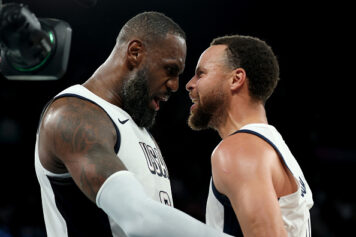I regularly give my iPod loving glances. I’m weird like that. But it has single-handedly made my life more tolerable, for it allows me to ignore all sorts of annoying noise one encounters in New York City: subway rants, teen chats and, most importantly, the unsolicited comments of men. Granted, those rants by zealots, the drunk, high, or mentally ill can be hostile, but harassment by men can feel more so, as it tends to be more frequent and targeted, the kind of stuff one can take personally. While some men appear well-intentioned, it’s when you don’t welcome their advances that you get to see what they’re truly about. So, when I politely decline to give you my number or tell you that I have no interest in being “friends” and you clap back with the classic, “you ain’t all that anyway, bitch,” well, you’ve only confirmed why I couldn’t be bothered to begin with. I often have intense exchanges on 125th Street in Harlem, especially at bus stops. They can be some of the most annoying places because you can’t keep it moving, held hostage and susceptible to all manner of harassing male shenanigans.
Once, whilst waiting on the bus, I was the hostage to one such fool, talking nonstop and robbing me of my time and my patience. The bus finally came and I continued to decline his advances so he started yelling, “you ain’t my dream!!!” Who says that? Well, being the spitfire that I am, I start yelling my usual retort, “but you’re hollering at me though!” Yeah, I get really poetic when heated. We were both on repeat, even as I’m boarding the bus looking like a crazy person. The bus driver, a sista, tried to calm me down with something to the effect of “You can’t let these fools get to you. You know how men are.” When you are angered by this perpetual battle of the sexes, that is what you invariably hear. And, as black women who, as Kimberle Crenshaw noted , “by virtue of our race and gender are situated within at least two systems of subordination: racism and sexism,” we are expected to add this to our bag of daily frustrations, aggressions, and assaults that weigh us down and greatly reduce our quality of life, whether we’re conscious of it or not.
In my travels abroad, I’ve experienced street harassment in ways that have only crystalized what it means to live on a male-dominated planet. My girl told me in advance that, if I wanted to minimize the harassment by men in Cairo, Egypt, I needed to rock a long tunic that covered the hip, thigh and derrière regions, long sleeves and show no cleavage. The harassment was intense regardless: the leering that just has a way of making you feel dirty and unsafe, the calling out in an unfamiliar language which makes you wonder whether you are oblivious to the signals of imminent danger. The fact that I wore nothing form-fitting and had almost no flesh showing speaks to the notion that street harassment has less to do with what a woman does and far more to do with something else. But what is it? Very little formal research has been done about the motivations of perpetrators of what is called stranger harassment, i.e., the unwanted sexual attention from strangers in public, which is fascinating considering both how many women throughout the world endure it on a daily basis and the seemingly insignificant stuff people study ad nauseam. You’ve got women-only passenger cars in countries like Japan, Egypt, India, Brazil, and Indonesia to prevent the groping and harassment of women by men, yet folks aren’t investing the time and energy to find out why these forms of gender-segregation seem necessary and how to go about minimizing the harassment in a way that doesn’t force the victims of it to change how they operate. The work that has been done suggests that potential motivating factors are related to men’s individual attitudes and personalities (such as being misogynistic or seeking to establish power over women) and environmental and societal norms (such as feeling anonymous in group settings and therefore able to get away with it or as an act of bonding men to one another at the expense of women).
The harassment I experienced in Cartagena, Colombia takes it to the next level. Cartageneros would get the gold, were “hollering” an Olympic event. Not because they are good at it, but because they are persistent. They make 125 in Harlem look like an oasis of respect for womanhood. I was walking around by myself my first day there last year and, at some point, it was so intense that I had to go home. Every single car and moto had to honk, many driving slowly beside me. Every man had to speak, no matter what his age. I just wanted to stop the noise, to disappear. And when you’re in a new country, you never quite know what the line is. Do people grab here? Will they react violently to rejection? At some point, I realized that men there in general didn’t grab, they just stare, comment and slurp incessantly. This summer I returned to spend two months in Cartagena and wanted to hit someone with a little Puerto Rican judo pretty much every day. The word seemed to go around in the neighborhood where I stayed that I was coming from New York. This was obvious when I walked through La Plaza from yoga and one idiot screamed out for all to hear in English, “Beautiful ass!!” Grrrr! I can’t quite figure out whether men don’t know or simply don’t care how humiliating the commenting can be. And the way it’s done there appears compulsive. If I walk by ten men at least eight of them seem COMPELLED to speak, like their manhood depends on it. And if societies dictate that this is how you define manhood then it becomes sanctioned and normalized. And like Roland Barthes posited in Mythologies, a myth is produced that gets people to see something that is a function of history and culture as something that is natural and biological. Once this happens people think nothing can be done about it.
The kind of daily work necessary just to get through the streets is taxing. It’s beyond an appreciation of the female form or a love for women. You begin to wonder whether men see you as anything else but a sexual object. And the problem with objectification is that it is easy to abuse something you see as less than human. Consider the ridiculous justifications of the brutality against the enslaved that were considered proprietary objects. In Cartagena people will tell you “oh that’s how men on the coast (i.e. black) are.” Here we go again. Same excuse, different location. The “boys will be boys” sh*t just isn’t good enough. Although street harassment is, by no means, the sole domain of black men, the men of African descent in places like Harlem and Cartagena seem to be feeding into stereotypes about hypersexuality and black maleness, which makes the whole production even more frustrating. Many men will try and pass it off as something they can’t help; but, unless you’ve got Tourette’s and the pssting is a result, I’m not buying it. You have the power to do better. Ask yourself what you think you’re gaining by making ridiculous comments to any woman who tickles your fancy. Who are you trying to impress by doing so? And why do you care so little about the woman on the receiving end?
But listen here, I would be bullsh*tting if I didn’t say that I DO NOT want to be invisible. Even though I’m totally aware of the beauty myth, the idea that beauty as we know it is socially constructed and is used to disempower women by making us compete against one another and constantly struggle to meet unattainable standards (check out Naomi Wolff for more). I understand how beauty is used to make some of us appear powerful with regard to men, but that, in reality, anything we attain from physical attributes can be seen as a Pyrrhic victory due to all that we must sacrifice in order to achieve it. Yet, I still want to be aesthetically appealing and sexually attractive. I like a little fawning attention every now and again. But fawning in a way that doesn’t demean me or minimize all of my other attributes that I feel are far more important. I don’t want to live in a world where people who are attracted to one another can’t express respectful pleasantries. Sometimes, such things can really put a smile on my face. And folks may say “well where’s the line? Y’all women got us scared to say anything at all.” Look, the old adage about whether you’d be okay with someone making slurping sounds or rude comments to your mother/daughter/sister/nana/titi or any other revered woman in your life, seems to work well. And if you don’t have a woman who you’d have a problem with being spoken to any ol’ way, then I think we’ve gotten down to one of the keys to the issue.
Fundamentally, it’s a matter of respect, which particular people are deemed worthy of it and how it’s conveyed. There must be a major shift in what men deem as acceptable behavior with regard to women. This applies to all societies, as street harassment is definitely not limited to black communities. But considering the continued marginalization of black communities worldwide, we’ve got to understand, as Patricia Hill Collins suggests in Black Sexual Politics: African Americans, Gender and New Racism, that if social inequality is really to be tackled, we’ve got to address what defines black masculinity and femininity and how black sexual politics (i.e. “ideas and social practices shaped by gender, race, and sexuality that frame all men and women’s treatment of one another, as well as how individual men and women are perceived and treated by others”) are implicated in perpetuating these inequalities. This goes beyond street harassment. Grown men need to be socially and emotionally mature enough to handle rejection and understand that, because I am a woman, it does not mean that I am in any way obligated to speak to you. And your belief that I am speaks to a much larger problem of believing that women’s actions, minds and bodies somehow exist to be dominated whenever you see fit. But if you prefer to have an exchange between equals over one that could lead to a real life version of Street Fighter, pretty please, stop pssting at me like I’m your pet. Quit following me on the street. Don’t yell, “damn, she got a fatty” for all your boys’ amusement like you’re thirteen. No, my name isn’t “light-skinned” and, as my fellow Jersey sista Queen Latifah once said, “no, my name ain’t ‘yo’ and I ain’t got ya baby.”



